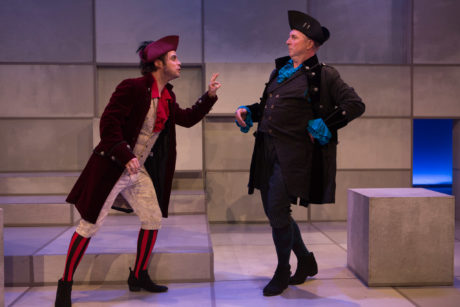The 18th century French playwright and philosopher Denis Diderot is known best among theatre folk for his theoretical writings: on the actor, the 4th Wall, and the emergence of scenography as an aesthetic element.

With Rameau’s Nephew, now playing at Spooky Action Theatre, we see the cultural critic and the playwright merge, and with it the birth of the modern era.
In the play, “Me” (“I” in this translation by Shelly Berc and Andrei Belgrader) meets “Him” (in this translation “He”) in a walled-in bunker of sorts. During the play stones from the wall are punched through to become portals to the outside world, as well as sitting cubes, hard benches, or picture windows in (or on) which the characters peep or sit and chat with one another.
“Me” is a high-minded, if voyeuristic, philosopher who enjoys a good debauch: some have assumed “Me” to be Diderot himself. But it is much more interesting to view “Me” as “Me”; that is to say, as you, you, and you as you look at “Me” and say: “Me.” And yes, I hope that makes sense in an ironic sort of way.
Meanwhile “Him” is a hedonist and a musician-teacher who no longer believes in the high-mindedness of elite society: some have assumed “Him” to be Jean-François Rameau, nephew of the famous French composer. But, again, it is much more interesting to shout: “It’s ‘Him’! It’s ‘Him’!” when thinking about “Him” and his bad-boy behavior.
To be sure, their dialogue primarily swirls around the question of ethics, its purpose, its efficacy, its place in the world. Given the fact that their world, like our own, swirls around the acquisition of money and pleasure, the ethical does assume its proper role.
“Me”, the cultural elites of Diderot’s day, takes on morality as humanity’s highest goal, as its foundational role in the world: only a brute would willingly and knowingly cast off morality as a social imperative.
“Him”, however, has done just that. As Nietzsche would declare “God” to be dead a century later, so now “Him” declares morality to be servile and undeserving of its status in the world.
For “Him”, as being “good” does not lead to happiness, so being “bad” is equal to being “good” and all the world’s a stage.

“Me” attempts to engage “Him” in point/counterpoint philosophy, but his young upstart, played with roguish “good” energy by Robert Bowen Smith, cannot be pinned down; and “Me”, given a bit of the “stuffy” by Ian Levalley has no answer to the freewheeling “Him”, who not only punches holes in the walls of “Me” but also dances circles round his out-of-date, impractical way of thinking the world is.
To be sure, in the audience’s heart of hearts (so to speak) each of us wants to side with “Me”; I mean, who wouldn’t want to side with the “Me” in this play; after all, it’s the epitome of all things self-referential. But it’s hard when “Me” seems so old and hypocritical and elitist and a bit of a blitherer.
Indeed, to today’s youthful voter the current political debate must sound somewhat like Rameau’s Nephew.
Nothing but a circus of proclamations for which the stodgy linguist has no retort.
Or a carnival of gaffs in which the reasonable goes down for the third time.
Or perhaps a pageant of pontificators all fit for Halloween but hardly an inauguration.
So what’s a regular Jane or John or Jim or Joy to do? Or a simpleton for that matter? Or even an honest person trying his best to live an authentic life.
In the end, with our pockets picked and the holes in this fortress of self multiplying exponentially, should we be thankful for the breeze even as we pray for a warm winter?
Or should we begin the process of rebuilding?
Diderot’s Rameau’s Nephew ponders such questions. We might not know the time, but we surely know what it’s time to do.
Rameau’s Nephew was directed by Richard Henrich, with those walls by Giorgos Tsappas, costumes by Erik Teague, lights by Brittany Shemuga, and sound by David Crandall.
Running Time: Approximately 90 minutes, with no intermission.
Rameau’s Nephew plays through November 13, 2016 at Spooky Action Theater – 1810 16th Street , NW, in Washington, DC. For tickets, purchase them online.
Note: This play is intended for audiences age 16 and over.
LINKS:
‘Rameau’s Nephew’ at Spooky Action Theater reviewed by David Siegel.
Magic Time! ‘Rameau’s Nephew’ at Spooky Action Theater by John Stoltenberg.





